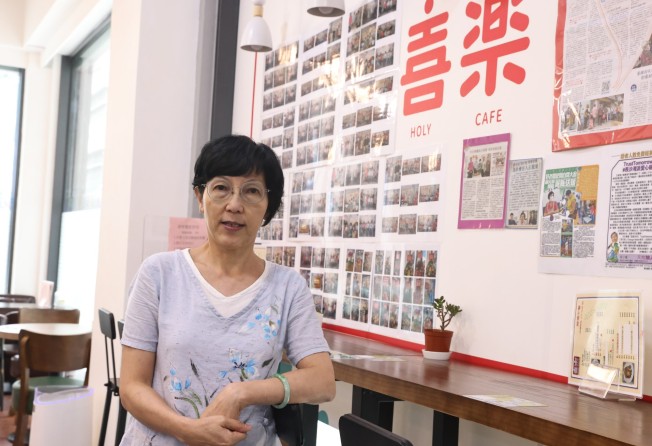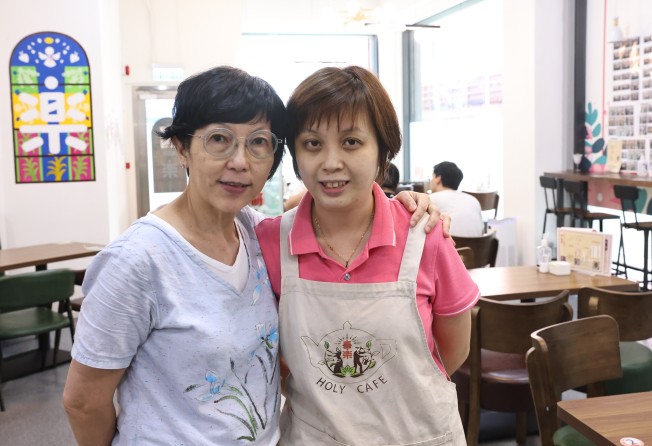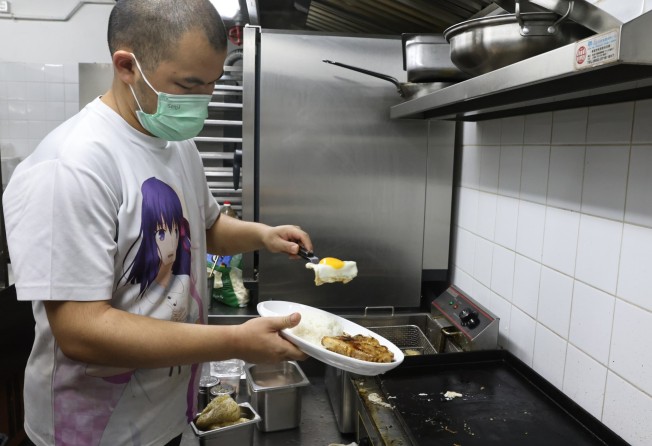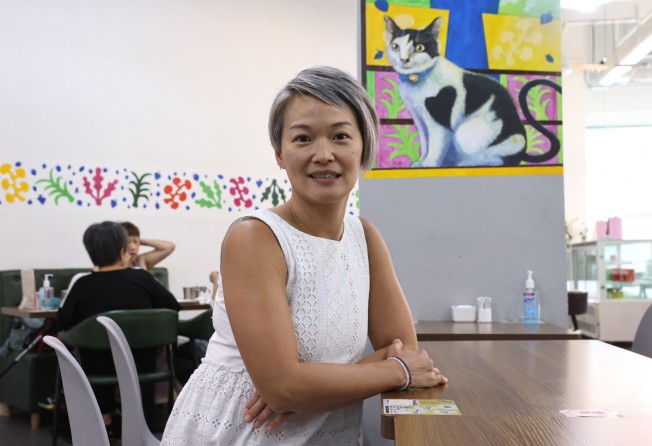
‘Staying at home – that is not a life’: mother set up social enterprise cafe in Hong Kong to get her autistic daughter out of the house – now she has 11 staff with special needs
- Holy Cafe looks like any other at first glance, but the Hong Kong social enterprise employs 11 staff with Down’s syndrome, impaired hearing and autism
- ‘The staff love coming to work,’ says proprietor Maria Sung, who gives them training and a salary to be independent. But pandemic woes threaten its survival

It’s 1pm and the Holy Cafe in the Kowloon district of Cheung Sha Wan is buzzing with diners.
On the surface it looks like any other place to eat in Hong Kong. But what makes this place special is that the staff have special needs, ranging from autism and Down’s syndrome to impaired hearing. For them, the cafe provides much needed employment and training opportunities so they can gain experience and independence.
But it’s the story behind the social enterprise that’s truly touching. In 2011, Maria Sung Law Man-kwan set up the cafe (back then it was in another location) because she wanted to give her autistic daughter, Flora Sung, a chance to work. It reopened in its current location at the beginning of the year.
Flora was 14 when she was diagnosed with autism, a neurological and developmental disorder that affects how people interact with others, communicate, learn, and behave.

Because of the range of autism symptoms, the condition is now called ASD (for autism spectrum disorder). In Hong Kong, the Autism Children Foundation estimates there are 25,000 children with autism in the city, with boys outnumbering girls.
Despite the challenges – Sung’s husband died of liver cancer when Flora was six months old – she was determined to give her daughter, who spent three years studying clerical skills at a special training school, as normal a life as possible.
But job opportunities for Flora were limited, so Sung got proactive. “Today there is more awareness about autism than there was 30 years ago,” she says.
With the lunch rush over, Sung, 63, gives a tour of the cafe, which employs 11 staff aged between 20 and 50.
In one room a member of staff is busy folding boxes ready to fill with mooncakes. Others are clearing and cleaning tables.

In the kitchen, chef Hugo Tai is in his happy place: busy working over a stove. The 22-year-old is wearing a cosplay T-shirt – he’s a big fan. Today, however, he is fully focused on cooking and has no time to talk.
Sung says it has been inspiring to watch Tai’s progress. “In the beginning, Hugo would not listen and do whatever he wanted – he didn’t care about the rules, which is very typical of those with autism,” she says.
“On one occasion he wanted to go to a cosplay convention but it clashed with his work schedule so he quit on the spot,” laughs Sung. After much talking and convincing he returned to work.
“I do this, not just because the staff love coming to work, but also because it helps to lessen the burden on the family members and carers of those with special needs,” says Sung.
The pressure of being a carer is something she is well aware of. For a time, Sung worked for the Correctional Services Department, but changed to domestic help because the job was more flexible and allowed her to take Flora to work with her.
“Staying at home all the time – that is not a life,” she says of Flora, who is now 35.
Fast forward to today, and Sung – like many in the food and beverage industry – is hurting from the fallout from the Covid-19 pandemic. Money is tight and she often dips into her own pocket to keep afloat the cafe that she set up with money from the sale of her flat.
“We opened the restaurant in this new location at the beginning of this year but then had to close because of the serious Covid restrictions,” Sung says. “Business is starting to get better but for a while we were losing more than HK$100,000 (US$13,000) a month.”
More donations, she says, will also help with another service: providing free meat and vegetable lunchboxes to elderly people in the area and in other low-income districts, such as Kwun Tong.
Each Tuesday, Thursday and Saturday, elderly people collect about 360 boxes from the cafe using a coupon scheme – that’s more than 4,300 a month.
“There are many old and lonely people around here,” says Sung, who in 2019 received the Rotary Club’s One Hong Kong Humanitarian Award that honours unsung heroes doing good in the community.
Also at the cafe is Elaine Choy. She is helping with translation duties but can relate to Sung’s struggles. Choy has two boys, one of whom – now aged 21 – has autism. She too hopes to operate a cafe that provides job opportunities for people with special needs.
Like Sung, she says there needs to be more support, not just for those with special needs, but also for the parents and primary carers.
“In Hong Kong we have schools for special needs children, but after graduating and vocational training, most find it difficult to get jobs,” says Choy.

According to a Census and Statistics Department survey, in 2020, there were about 534,200 people in Hong Kong with disabilities, including restricted body movement, seeing and hearing difficulties, mental illness and ASD.
The Covid-19 pandemic has taken a heavy toll on carers, Choy says. “When schools were suspended and teaching moved online, parents and carers were stuck at home. They couldn’t go to work and that meant no income. Mental health issues surfaced … It’s terrible.
“Routine is very important for those with special needs. If they lose a routine, and they don’t understand why, because Covid is complicated, it’s very stressful for them and the carers.”
Choy also wants more education about and better awareness of conditions such as autism. “We need to teach acceptance so people can respond better.”
Holy Cafe, 777-783 Yu Chau West Street, Cheung Sha Wan, Kowloon. Donation details: Self Strengthening Service Centre Limited, The Bank of East Asia. Account no: 527-104026332. For donations over HK$100, Holy Cafe will issue a tax receipt.